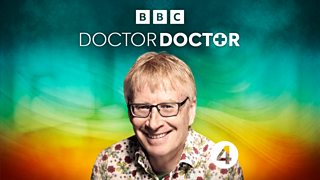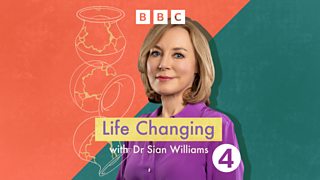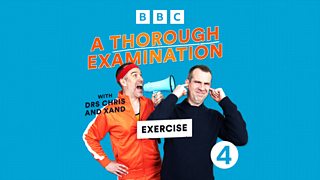Six surprising tales from the GP’s surgery
In ±«Óătv Radio 4 podcast, Doctor Doctor, medic, investigative journalist and comedian Dr Phil Hammond interviews guests from across all areas of the health service – from surgeons to GPs, sexual health specialists and psychiatrists – to uncover the excitement and challenges facing a 21st-century medic.
From the suicidal patient who cured their doctor’s dog phobia, to the heavily pregnant GP delivering a baby on her treatment couch, to the junior doctor comforting the grieving family of a young cancer sufferer, these are life-affirming stories of highs and lows, commitment, bravery, skill, heartache and love.
Here are six surprising stories from the frontline of UK medicine.

Listen to Doctor Doctor on ±«Óătv Sounds
“This stoical, incredible lady ended up delivering her beautiful baby boy on the treatment room couch”
At 35 weeks pregnant, GP Caroline Rance was winding down for maternity leave when a lady “burst in through the front door” of the surgery, “bump first, saying ‘I’m having a baby.’”

Initially, Caroline was calm, aware “how long these things take”. The doctor calmly put the kettle on, and called for some transport to hospital. Then she decided she’d better just examine the patient. “To my – and I think probably her – surprise, she was ten centimetres dilated, ready to push,” she recounts. “With no ambulance in sight, this stoical, incredible lady ended up delivering her beautiful baby boy on the treatment room couch.” With no towels to hand they wrapped the baby in couch roll and placed him on the mum’s tummy to keep him warm, and when the lady delivered the placenta a few minutes later, they caught it in a vomit bowl.
“The worst part of all of this was, after tipping amniotic fluid out of my shoes and having a quick shower under a running tap in my sink in the room, I had no change of clothes other than my own maternity grab bag in the boot of my car,” says Caroline. “I basically did the rest of my surgery dressed in the pyjamas I was planning to wear following the delivery of my own baby a few weeks later.”
“The addictive potential for gambling is even worse than cigarettes”
Dame Clare Gerada is President of the Royal College of General Practitioners, an inner London GP and a specialist in addiction. She has managed every form of addiction ranging from alcohol, to drugs and sex, but believes “gambling is the worst” because “you can destroy everything very quickly”.
Clare has patients who have lost the deposit on their house. “£100,000, and it’s gone. It’s gone in a flash,” she states. “I’m not saying one is better than the other,” says the addiction specialist, “but you cannot use a hundred thousand pounds worth of drugs in a weekend, you cannot drink a hundred thousand pounds worth of alcohol, but you can destroy – absolutely destroy – your entire family, rapidly.”
“Gambling is such a hidden addiction as well,” she warns. “It happens behind closed doors, secretly on your mobile or on your computer.” The stigma also means it’s harder for people to receive the help they need and yet, she says, “the addictive potential for gambling is even worse than cigarettes”.
Thankfully, she says, “it’s as treatable as alcohol or drug dependence” so if you’re suffering, “please seek help”.
“Even when you think you can do nothing as a doctor, or as a human being, there is always something”
NHS palliative care specialist, Dr Rachel Clarke, was in her second year as a doctor when she was called to “a heart-breaking case of a young woman who was dying of breast cancer”. The patient, in her twenties, was surrounded by her family – distressed and anguished.

“I didn’t really know what to do,” she admits. “I had to figure out how to help a father, a mother, siblings who were beside themselves with grief.” And so, she sat, and listened, and asked them to tell her about their daughter. What did she love? What was she like? “I didn’t know if I was doing the right thing but gradually this sort of wrath, this rage – blind rage – subsided.”
In the end, she said to them, “‘This is unimaginably horrific but the moment I walked into this room I could see that your daughter was surrounded by love, and you are giving her that. She is surrounded by love, and it’s beautiful.’” They all cried together, and the family thanked her.
“I learned from that, that even when you think you can do nothing as a doctor, or as a human being, there is always something you can do, always, no matter how horrendous the situation. And I try to teach that today to young doctors.”
“My mother always used to take flowers to the poor lady who lost her baby on my birthday”
World-renowned heart surgeon Stephen Westaby explains how the very day he was born played a part in steering him towards his specialist area of medicine. “There were curious circumstances that really helped define my direction throughout life,” he states.
“I was born, and in the cot next door in the maternity hospital in Scunthorpe was a baby that was not doing well,” he says. The baby was blue. “I was in the cot, pink, bellowing from my lungs, and this baby was whimpering, and there was something wrong.” When the doctor was called, he explained that there was a congenital heart problem, not enough blood was getting to the baby’s lungs, and there was “nothing at all they could do about it”. The baby sadly died.
“The only reason I know about that was that on my birthday, my mother always used to take flowers to the poor lady who lost her baby,” recounts the surgeon. “I eventually, when I was five or six, asked why, and my mother told me the story.”
“I would try to tolerate having this dog in the room even though I was terrified”
Comedian, psychiatrist and writer Benji Waterhouse says there was one patient who “literally helped to cure” his dog phobia, which he developed after being attacked when he was little.

“He was an alcohol-dependent homeless man who always brought this bulldog along to his appointments,” the doctor explains. “The patient had been referred because he was thinking of ending his life, so I didn’t want to potentially unsettle him by kicking the dog out, seeing it as his emotional support pet, so I would try to tolerate having this dog in the room even though I was terrified.”
“He obviously sensed that and he kind of took it upon himself to try and give me flooding therapy and help to cure me of my phobia by encouraging me to stroke this dog, saying that it might be good for me.” The man assured him that the dog, despite being named Tyson, would never hurt a fly.
And the patient, who rarely turned up for appointments, started engaging really well from then on, states Benji. “I sense it was perhaps because he felt, for the first time in a while, purposeful… I guess that reminded me of the importance that everyone needs purpose in life.”
“He’s stopped screaming, I go down to look at him, and he’s died on me”
When Dr Phil Hammond was practising as a GP, he was called in the middle of the night by a woman whose husband had “fallen up the stairs and broken his knee”. Thinking it more likely the patient had dislocated his knee cap (patella), he looked up in a book how to sort it. And when he arrived at the house, he could “tell immediately that he’s dislocated his patella”. Amazingly, the doctor remembered the procedure and was able to pop the knee back in place.
“I felt so proud of myself that I’d just done this amazing practical thing that I wasn’t very good at,” he recalls. “He’s stopped screaming, I go down to look at him, and he’s died on me. The reason he’s collapsed on the stairs is that he’d had a cardiac arrest.” Phil had been so focused on the knee that he hadn’t assessed the whole patient.
He thought that was the end of his career but the wife sent him a lovely letter thanking him for attending her husband in the middle of the night and for trying his best. “It probably wouldn’t have made a difference because we didn’t have portable defibrillators in those days,” he says.
Listen to Doctor Doctor here
-
![]()
±«Óătv Action Line
Information and support for issues covered in these programmes.
-
![]()
Life Changing
Dr Sian Williams talks to people who have lived through extraordinary events that have reshaped their lives in the most unpredictable ways.
-
![]()
The Gift
Without us realising, an enormous DNA database has been created online. But what happens when online ancestry tests reveal more than you had bargained for?
-
![]()
A Thorough Examination with Drs Chris and Xand
Drs Chris and Xand van Tulleken explore the science of exercise and the dangers of inactivity.




